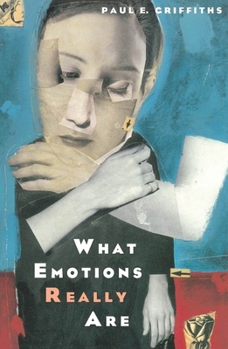What Emotions Really Are: The Problem of Psychological Categories Volume 1997
Select Format
Select Condition 
Book Overview
In this provocative contribution to the philosophy of science and mind, Paul E. Griffiths criticizes contemporary philosophy and psychology of emotion for failing to take in an evolutionary perspective and address current work in neurobiology and cognitive science. Reviewing the three current models of emotion, Griffiths points out their deficiencies and constructs a basis for future models that pay equal attention to biological fact and conceptual rigor. "Griffiths has written a work of depth and clarity in an area of murky ambiguity, producing a much-needed standard at the border of science, philosophy, and psychology. . . . As he presents his case, offering a forthright critique of past and present theories, Griffiths touches on such issues as evolution, social construction, natural kinds (categories corresponding with real distinctions in nature), cognition, and moods. While addressing specialists, the book will reward general readers who apply themselves to its remarkably accessible style."--Library Journal "What Emotions Really Are makes a strong claim to be one of the best books to have emerged on the subject of human emotion."--Ray Dolan, Nature
Format:Paperback
Language:English
ISBN:0226308723
ISBN13:9780226308722
Release Date:August 1998
Publisher:University of Chicago Press
Length:293 Pages
Weight:0.95 lbs.
Dimensions:0.7" x 6.0" x 9.0"
Customer Reviews
2 ratings
The concept of emotion is useless
Published by Thriftbooks.com User , 24 years ago
I found this book very useful for expandng my knowledge about how science and psychology form logical categories of emotion. I think he makes a good case for the lack of specificity or clarity of thinking in using one class, emotion, for all the different terms people use for the feelings and emotions in daily life. Since this book was written Antonio Damasio has a new book, "The Feeling of What Happens: Body and Emotions In The Making of Consciousness. This work answers some of questions raised by Griffith concerning the higher cognitive feelings and the disclaimed actions or, as if, feelings. I think this book should be read alongside James Hillman's "Emotion" to give a more rounded historical and philosphical view to the topic. His writing style is abstract in that he often does not turn his concepts into description, instead points to another concept or idea which assumes the reader clearly understands both which I did not at times. Nevertheless, I recommend the book and learned alot from it.
Thorough, careful, and profoundly useful
Published by Thriftbooks.com User , 25 years ago
This is a breath of fresh air, a thorough and detailed acccount of the scientific and philosophical issues behind human emotions that does justice to virtually all of the data. The author takes a definite stand against "propositional" theories of emotion (based on intuitively defined beliefs and desires), but makes very clear what the alternatives are and what data lies behind them from the major research programs. One of the most interesting aspects is an excellent discussion of the power and limits of "adaptationism," where we may be able to explain emotions as evolved adaptive mechanisms, and where other explanations serve better. This is a book that everyone with a slightly more than casual interest in evolutionary psychology or sociobiology can probably benefit from, whether they are proponents or critics. The reasoning behind evolutionary explanations and where they fall short is particularly good.As might be expected, the author doesn't leave us with a specific theory of emotions so much as a renewed way of looking at the questions, and a better understanding of how to interpret data claimed to support a particular theory of emotions.This book joins another one co-authored by Griffiths, "Sex and Death" also by Kim Sterelny, as two of the most useful books available for understanding the central issues for studying human psychology informed by biology.






